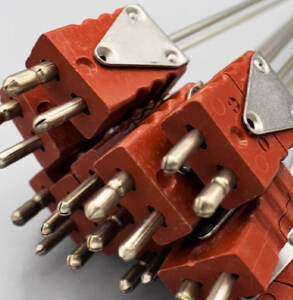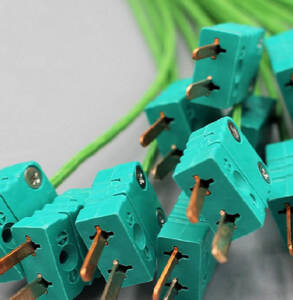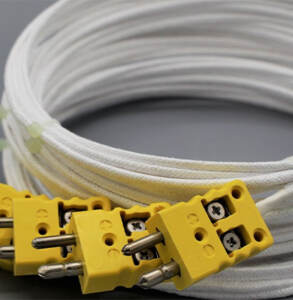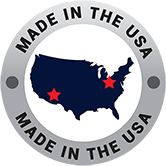High-temperature thermocouples play a critical role in delivering accurate temperature readings in the toughest industrial conditions. At Cleveland Electric Laboratories, we specialize in engineering high-temp thermocouples built for reliability and performance, backed by more than 100 years of expertise. Our high-temperature thermocouple solutions are developed to operate in extreme environments reaching up to 2,700°F (1,482°C), where traditional sensors cannot survive. These advanced sensors provide precise measurements for demanding applications in aerospace, glass manufacturing, steel processing, and power generation.
Platinum Composite Sheath Thermocouples
Platinum Composite Sheath Thermocouples enable flexible and responsive high temperature measurement with a compact and cost-effective package design in environments where Base Metal Mineral Insulated Metal Sheathed cable would be unable to survive. These very high temperature thermocouples are an excellent option when an extended length probe is necessary but only a portion of the sheath length is exposed to extreme heat.

Technical Specifications
| Specification | Details |
|---|---|
| Calibration Types | B, R & S |
| Sheath Diameters | 0.020″ – 0.250″ |
| Temperature Range | Up to 2,700°F (1,482°C) |
| Termination Options | Exposed leads, plugs/jacks, soft wire transition |
| Certification | Individual or lot certification available |
| Primary Applications: | Gas turbine testing, aerospace engine monitoring, industrial furnace control |
Thermocouples for Glass Industry Applications
Temperature control and purity are critical factors in glass manufacturing, whether producing laboratory glassware, windows, beverage containers, or specialty glass products. Our thermocouples for high temperature applications are used throughout the glass manufacturing process, including melting, refining, feeder channels, working end processing, and combustion space monitoring.

Technical Specifications
| Specification | Options |
|---|---|
| Calibration Types | B, R & S |
| Wire Gauge | 24 AWG (Standard) |
| Protection Tubes | Alumina, Mullite, Silicon Carbide, Re-Crystallized Silicon Carbide, Inconel |
| Termination Options | Exposed leads, plugs/jacks, soft wire transition |
| Special Coatings | Platinum thimble, platinum spray coating |
| Applications: | Fore hearth, melter crown/bottom/side wall, regenerator crown, refiner, distributor sump, spout, throat, glass level, glass furnace |
Additional High Temperature Thermocouple Solutions
For the most extreme high temperature applications, our noble metal thermocouples provide unmatched performance and accuracy:
Type R (Platinum-13% Rhodium/Platinum)
- Temperature range: 0°C to 1,600°C (32°F to 2,912°F)
- Excellent stability and accuracy
- Ideal for precision laboratory applications
Type S (Platinum-10% Rhodium/Platinum)
- Temperature range: 0°C to 1,600°C (32°F to 2,912°F)
- NIST standard for high-temperature calibration
- Superior long-term stability

Type B (Platinum-30% Rhodium/Platinum-6% Rhodium)
- Temperature range: 600°C to 1,800°C (1,112°F to 3,272°F)
- Highest temperature capability
- Self-compensating at room temperature
Tungsten-Rhenium Thermocouples
For ultra-high temperature applications in inert or vacuum environments:
- Temperature range: Up to 2,300°C (4,172°F)
- Applications: Vacuum furnaces, spacecraft, research applications
- Advantages: Highest temperature capability available



